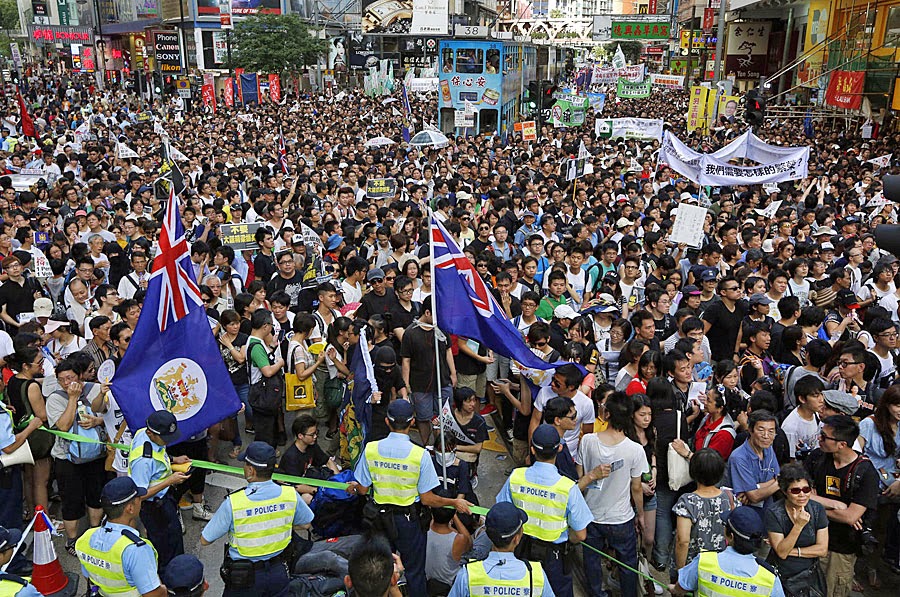Huge protests in Hong Kong. In the foreground are 2 official-up-to-1997 British-Hong Kong colonial (Chinese dragon - British lion) flags - defiantly displayed by the students.
---
Main site of the protests - next to the main PLA, Police and Hong Kong Government headquarters and intentionally blocking traffic on the city's major highways.
Many thousands of Hong Kong students and broader protest groups have been defying Chinese authorities for the last few days. China's Communist Party, the ultimate ruler of Hong Kong, looks unkindly at any right to protest. The students are aiming high for a liberalised voting system freer than before. Will the tanks of the Peoples Liberation Army (PLA) crush them as they crushed an earlier generation of students at Tiananmen Square?
Two of the major figures in the protest are Joshua Wong, only 17, who lead the "Scholarism" movement against Communist indoctrination in Hong Kong schools and Benny Tai Yiu-ting, a Hong Kong University academic who created the Occupy Central With Love and Peace movement.
By mainland Chinese standards Hong Kong has it lucky – relatively prosperous, educated and almost free. Hong Kong is privileged by the "one country two systems" policy – part of the deal negotiated with Britain when Britain returned its Hong Kong colony to China in 1997. The policy allows for a version of democracy until 2047. The right of a committee to elect any candidates (no matter how communist) for leader of Hong Kong in 2017 is what the protests are about. The Communist Party wishes to appoint a small pool of authorised, pro-Communist candidates for the leadership position. As the current leader CY Leung, the "Chief Executive of Hong Kong Special Administrative Region" is suspected of being a closet member of the Communist Party he is currently the main focus of protest anger.
Hong Kong protests against the central government of Beijing itself have been limited. A continuation of the protests, particularly any aimed at Beijing involves considerable dangers for the protestors.
So far Hong Kong authorities have been using a range of tactics to handle the protests. Protestors directly defied the authorities by centring their protest next to official headquarters of the Police, PLA and Hong Kong Government (scroll down half way for map) [the map is also above this article]. On Sunday authorities first tried to disperse the protesters with police using tear gas, pepper spray and batons.However this only swelled the numbers of protesters and hardened their resolve to maintain sit-ins blocking major roads on Hong Kong island. By Monday the government withdrew the police leaving a peaceful protest that is still causing economic disruption to Hong Kong. A regular public holiday on Wednesday is expected to boost protest numbers. What happens then may be violent or peaceful.
Direct defiance of Beijing could be fatal for protesters - but they are hoping and expecting that the international media and Hong Kong's special economic status will dissuade the authorities from cracking down too hard. Adding to the unpredictability of what may happen is the relative newness of China's President Xi Jinping, who only took power in 2012. If he sees the protestors as a political threat that may spread to mainland cities the protestors may be punished severely. The Chinese President, however, would be well aware of the national shame of Tiananmen Square Massacre in 1989. In contrast most of the Hong Kong protestors would have little knowledge of Tiananmen Square because they are too young and even the Hong Kong media would censor many of the records of Beijing's more ruthless political acts.
If Beijing decides on a crackdown it is more likely that it will first send in anti-protest specialists, the paramilitary People's Armed Police (PAP), steeped in the tactics of crowd control. If the PAP is repulsed by numbers a lull may occur with the hope of peaceful dispersal through boredom. If a severe crackdown is ordered then the Tiananmen script may be dusted off with the infantry and armoured vehicles of Hong Kong's garrison being sent in. Such an attack might typically be launched at 3am to catch the students asleep and to minimise TV coverage.
Hopefully a more peaceful script will be followed. This may vary from community pressure where citizens remind the students that the economy of Hong Kong (jobs) are being disrupted with no end in sight. The Hong Kong government may plead that it will form a committee to consider student demands. Whether the government honours such an undertaking and doesn't subsequently round up the ringleaders is another thing.
An intermediate script of an arranged counter-demonstration of bussed-in Party faithful, as occurred in Great Olympic Torch mobilisation of Canberra, 2008, may also be a possibility.
In a few days we'll know what happened. The protests are bad for business in Hong Kong while a democratic Hong Kong is good for business in China. China's President Xi Jinping is an unknown quantity when his authority is really tested. In a China run by a Communist Party that is distinctly capitalist anything can happen.
Pete


1 comment:
New Zealand is also suffering Chinese Government interference.
Australia's ABC News reports November 28, 2018 https://www.abc.net.au/news/2018-11-28/winston-peters-warns-against-chinese-inteference/10560478
"Winston Peters, New Zealand's Deputy Prime Minster and Foreign Minister, says it would be "naive" to think general citizens are not being spied upon by foreign powers..."
"Key points:
- Winston Peters says Chinese nationals fear reach of Beijing when abroad
- The Five Eyes alliance has broadened intelligence-sharing activities to Germany and Japan to combat China, and
- A New Zealand professor was placed under police protection after her research was stolen
Post a Comment